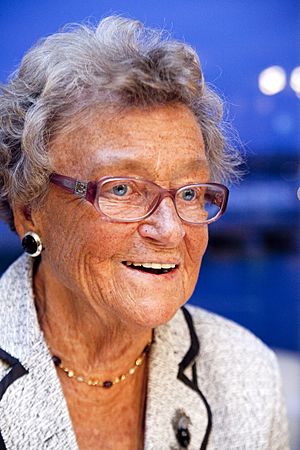Karin Söder facts for kids
Quick facts for kids
Karin Söder
|
|
|---|---|
 |
|
| Minister for Foreign Affairs | |
| In office 8 October 1976 – 18 October 1978 |
|
| Prime Minister | Thorbjörn Fälldin |
| Preceded by | Sven Andersson |
| Succeeded by | Hans Blix |
| Minister for Health and Social Affairs | |
| In office 12 October 1979 – 8 October 1982 |
|
| Prime Minister | Thorbjörn Fälldin |
| Preceded by | Gabriel Romanus |
| Succeeded by | Sten Andersson |
| Personal details | |
| Born |
Karin Ann-Marie Söder
22 June 1928 Kil, Värmland |
| Died | 19 December 2015 (aged 87) |
| Political party | Centre Party |
| Occupation | Teacher |
Karin Ann-Marie Söder (born November 30, 1928 – died December 19, 2015) was an important Swedish politician. She belonged to the Centre Party. Karin Söder made history in Sweden. She was the first woman to lead a major political party in the country. She was also one of the first female foreign ministers in the world.
Early Life and Career
Karin Söder was born in Kil, a town in Värmland, Sweden. Before becoming a politician, she worked as a teacher. This background likely helped her in her later career. She learned to communicate clearly and understand people's needs.
Becoming a Government Minister
Karin Söder became a member of the Swedish government. She served as a minister twice. From 1976 to 1978, she was the Minister for Foreign Affairs. This was a very important job. It meant she represented Sweden to other countries. Being one of the first women in this role globally was a big achievement.
Later, from 1979 to 1982, she became the Minister for Health and Social Affairs. In this role, she worked on issues important to people's daily lives. This included health care and social support.
Leading a Political Party
In 1985, Karin Söder became the leader of the Centre Party. This was a historic moment for Sweden. She was the first woman ever to lead a major political party there. She held this position until 1987. Her leadership opened doors for other women in Swedish politics.
Her Legacy
Karin Söder is remembered as a pioneer. She broke barriers for women in politics. She showed that women could hold top leadership roles. She also worked on specific issues. For example, she successfully pushed for Systembolaget, a state-owned alcohol retailer, to stay closed on Saturdays. This showed her dedication to her beliefs. Her work helped shape modern Sweden.
 | George Robert Carruthers |
 | Patricia Bath |
 | Jan Ernst Matzeliger |
 | Alexander Miles |

